|
|
|
Sort Order |
|
|
|
Items / Page
|
|
|
|
|
|
|
| Srl | Item |
| 1 |
ID:
148916
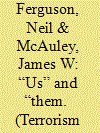

|
|
|
|
|
| Summary/Abstract |
This article draws on data from one-to-one interviews with members and former members of the Ulster Volunteer Force, Ulster Defence Association, Red Hand Commando, Ulster Political Research Group, and the Progressive Unionist Party to explore the dynamic and fluid perceptions of the Irish Republican Army (IRA) and Sinn Féin among Ulster loyalists. The article will explore how attitudes and perceptions are influenced by the shifting political landscape in Northern Ireland as Ulster loyalists come to terms with the new realities created by the peace process, security normalization, decommissioning, and the rise in the threat of dissident republican violence. The article will also demonstrate that these perceptions are not purely antagonistic and based on the creation of negative, stereotypical “enemy images” fuelled by decades of conflict, but pragmatic, bound to societal and local events, and influenced by intragroup attitudes and divisions, in addition to the expected conflictual ingroup vs. outgroup relationships. Finally, the article will explore how loyalists employ republicanism and the transformation of the Provisional IRA in particular, as a mirror or benchmark to reflect on their own progress since 1994.
|
|
|
|
|
|
|
|
|
|
|
|
|
|
|
|
| 2 |
ID:
131521
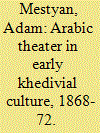

|
|
|
|
|
| Publication |
2014.
|
| Summary/Abstract |
This article revisits the official culture of the early khedivate through a microhistory of the first modern Egyptian theater in Arabic. Based on archival research, it aims at a recalibration of recent scholarship by showing khedivial culture as a complex framework of competing patriotisms. It analyzes the discourse about theater in the Arabic press, including the journalist Muhammad Unsi's call for performances in Arabic in 1870. It shows that the realization of this idea was the theater group led by James Sanua between 1871 and 1872, which also performed ?Abd al-Fattah al-Misri's tragedy. But the troupe was not an expression of subversive nationalism, as has been claimed by scholars. My historical reconstruction and my analysis of the content of Sanua's comedies show loyalism toward the Khedive Ismail. Yet his form of contemporary satire was incompatible with elite cultural patriotism, which employed historicization as its dominant technique. This revision throws new light on a crucial moment of social change in the history of modern Egypt, when the ruler was expected to preside over the plural cultural bodies of the nation.
|
|
|
|
|
|
|
|
|
|
|
|
|
|
|
|
| 3 |
ID:
160641
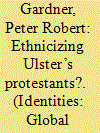

|
|
|
|
|
| Summary/Abstract |
The Ulster-Scots ethnolinguistic ‘revival,’ often considered to be the ethnic, cultural or linguistic expression of unionism and loyalism, has recently made inroads into schools across Northern Ireland. With intercommunal educational segregation pervasive in the province, the teaching of such an ‘ethnic identity’ has potential sociological ramifications. Utilizing an in-depth textual analysis of the Ulster-Scots Agency’s educational materials and interviews with educationalists and political elites, I contend that although this ethnicization represents a break of sorts with traditional unionist-loyalist ideas rather than an unproblematic reinforcement of them, it holds considerable potential for the deepening of normative senses of communal difference.
|
|
|
|
|
|
|
|
|
|
|
|
|
|
|
|
| 4 |
ID:
057562
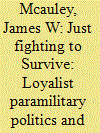

|
|
|
| 5 |
ID:
188067
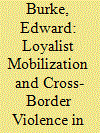

|
|
|
|
|
| Summary/Abstract |
This article argues that, at a tactical level, loyalist terrorism in the Irish border region between 1972 and 1974 worked. Cross-border attacks including bombings in Irish towns prompted the Irish government to reinforce security along the border—a long-standing loyalist demand. The loyalist campaign led to the IRA embarking on an effort to punish those who were believed to have passed information to loyalists, resulting in the killing of an Irish Protestant senator and widespread condemnation of the organization in the Republic of Ireland. However, short-term gains were outweighed by a growing perception among nationalists that the British state tolerated or even colluded in such attacks, undermining the British Army’s campaign to gain trust (and information) within the Catholic population of Northern Ireland. The article also contends that middle-class loyalists played an important role in mobilizing and equipping loyalist paramilitary organizations. It concludes that the British Army showed an excessive tolerance of loyalists with political capital or ties to the security forces, despite evidence that such individuals were directly supporting the activities of loyalist paramilitaries.
|
|
|
|
|
|
|
|
|
|
|
|
|
|
|
|
| 6 |
ID:
120324
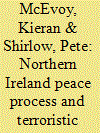

|
|
|
|
|
| Publication |
2013.
|
| Summary/Abstract |
In their article published in this journal, 1 Edwards and McGrattan charge that some of us who have written about the peace process in Northern Ireland "risk complicity in reproducing the terroristic narratives that inspired and perpetuated the conflict" (p. 357). Although the McCarthy-like logic of this argument would not normally warrant a scholarly response-if one studies, writes about, or heaven forbid seeks to understand Republicanism or Loyalism one risks reproducing "terroristic" narratives (whatever these are)-the piece is so riddled with inaccuracies, false dichotomies, and tendentious claims that we have been moved to reply. Moreover the introductory hook to their argument-that the Northern Ireland example of peacemaking is being misinterpreted in terms of countering violent Islamic extremism in Britain-requires that their arguments be critiqued lest they be taken seriously in policy circles.
|
|
|
|
|
|
|
|
|
|
|
|
|
|
|
|
| 7 |
ID:
112064
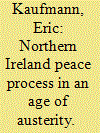

|
|
|
|
|
| Publication |
2012.
|
| Summary/Abstract |
The steady drip of dissident Republican attacks forms the backdrop to this special issue of Political Quarterly. Moreover, this comes at a time of economic austerity, when Northern Ireland faces unprecedented cuts to its public sector-dominated economy. The economic crisis in the South adds an additional layer of uncertainty to the picture. In the past, economic deprivation has been associated with conflict in Northern Ireland and elsewhere. Might the peace dividend and constitutional settlement which have underpinned the Northern Ireland 'miracle' since 1994 be under threat? Or is there now sufficient momentum in both of Northern Ireland's main ethnic communities that such an outcome can be safely averted? This paper summarises the thinking of our symposium and special issue on this topic, updating our picture of the Northern Ireland peace process.
|
|
|
|
|
|
|
|
|
|
|
|
|
|
|
|
| 8 |
ID:
112068
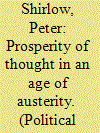

|
|
|
|
|
| Publication |
2012.
|
| Summary/Abstract |
A central failing of analysis of the peace process has been to account for, explain and determine the extent of loyalist-led conflict transformation. My argument is that, despite evident wrong-doing, there has been a failure to appreciate the prosperity of loyalist thinking and action in the period after the paramilitary ceasefires of 1994. Loyalism has appeared less relevant than it is to peacemaking due to its criminalisation, its refusal to accept positive morphology and a failure to self-promote. An appreciation of the positive nature of loyalist transition offers much to those who seek to comprehend the future of Northern Ireland.
|
|
|
|
|
|
|
|
|
|
|
|
|
|
|
|
| 9 |
ID:
080879
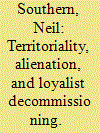

|
|
|
|
|
| Publication |
2008.
|
| Summary/Abstract |
During the Northern Ireland Troubles some Protestant communities suffered more than others. The loyalist Shankill area of West Belfast is one such place. Geographically situated between the republican strongholds of the Ardoyne and Falls, it was regularly exposed to violent attack. The area witnessed a series of republican bombings that included children in the death toll as well as many deadly shootings. Violence of this kind has left an indelible mark on the Shankill community. However, more than other loyalist areas, it was prepared to respond to republican violence with violence. But the community has not emerged from the Troubles with confidence. Unanticipated post-conflict factors of a political, cultural, and territorial nature are undermining efforts to promote community confidence and encourage paramilitary groups to decommission their weapons.
|
|
|
|
|
|
|
|
|
|
|
|
|
|
|
|
|
|
|
|
|